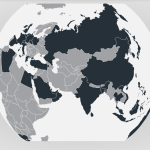The world economy is at a defining moment. Think of an accelerated industrial revolution, swept along by rapidly developing new technology and a shift in economic power from West to East. In parallel, governments are redirecting their economies through diversifying and pivoting, positioning them to focus on new growth sectors.
By 2030, China will be the world’s largest economy and India the third largest, according to HSBC research1. The same research predicts that, between now and then, emerging markets will make up about 70% of global economic growth, compared to its 50/50 split with developed markets over the past decade.
As economic change quickens, companies will naturally target the new growth markets and sectors. But doing so requires complying with local cash management and payments regulations, adapting to local practices in terms of how people buy things and pay for them – which may in themselves be changing.
The result? A company entering several new markets might face a jigsaw puzzle of cash management and payments systems. All of these must be established, maintained and monitored, as we explain in our paper ‘How a macroeconomic watershed is leading to microeconomic opportunities’.
Sign up for free to read the full article
Register Login with LinkedInAlready have an account?
Login
Download our Free Treasury App for mobile and tablet to read articles – no log in required.
Download Version Download Version























